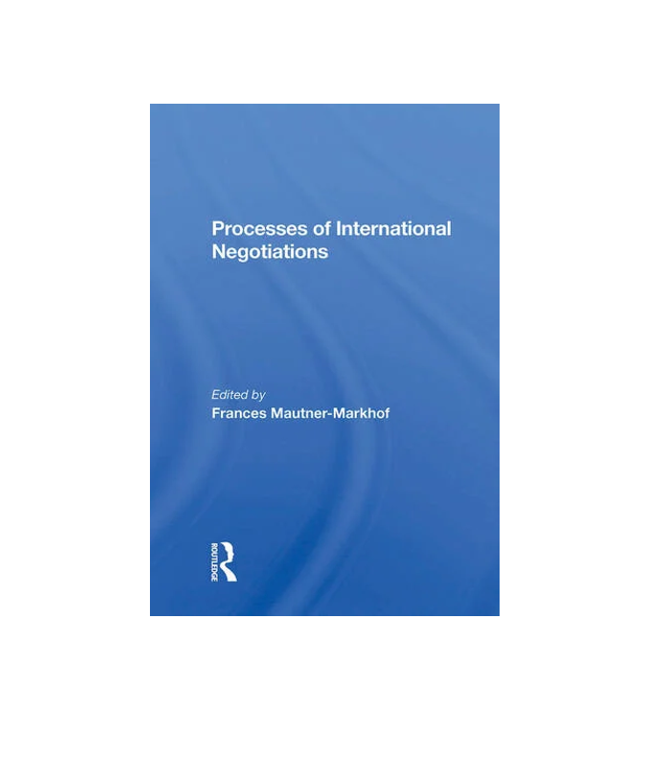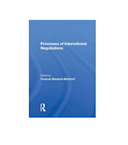
Processes of International Negotiations
Mautner-Markhof, F. (Ed.). (1989). Processes of International Negotiations (1st ed.). Routledge.

Abstract
Originally published in 1989, the goals of the Conference were to foster increased communication and understanding between practitioners and researchers and among various research disciplines, to present and discuss research results, and to identify possible future research activities. The participation and interaction of both high level negotiations practitioners and researchers were considered especially valuable and unique aspects of the Conference.All of the subjects dealt with at the Conference have direct and obvious relevance to improving negotiations outcomes on, and the ability to deal effectively with, such issues as the trans boundary effects (environmental,economic, etc.) of technological risk, security and confidence-building measures,and international economic cooperation- all of which are high on the negotiations agenda of many countries.
Contents
Introduction
I. The Role of International Organizations and Other Multilateral Mechanisms
1. Toward an Integral Analysis of International Negotiations - J. Kaufmann
2. Increasing the Role of International Negotiations and International Organizations - A. V. Scrguicv
3. Multilateral Negotiations: The Role of Presiding Officers-W. Lang
4. The CSCE Collaborative Order-E. Antola
5. Developing a Global Negotiating Machinery-G.K. Yafimov
6. International Negotiations: Mechanisms for the Management of Complex Systems-F. Mautnar-Markhof
7. Experiences of a Negotiator at the Stockholm Conference-K. Citron
8. From Negotiations to Consultations-R. Kloepzig and V. A. Richardson (UNIDO)
II. International Trade Negotiations
9. Joint Ventures: Joint Interests in East-West Trade?-U. KiviKari
10. Interaction between the Theory and Practice of Trade Negotiations: Experiences and Proposals of a Practitioner-C. Vlachoutsicos
11. Conceptions of the Trade Negotiation Process-S.B. Lundstedt
12. International Joint Venture Negotiations-F.F. Heimann
13. Hungary's Accession to GATT-J. Nyerges
14. International Multiparty Negotiation: The Electrolux-Zanussi Case-P. Gennaro
15. How to Negotiate for Joint Ventures-G.A. Wolf-Laudon
III. Cultural, Psychological, and Political Factors in International Negotiations
16. Cultural Predictors of National Negotiation Styles-G. Hofstede
17. Culture as a Factor in International Negotiations: A Proposed Research Project from a Psychological Perspective-Y.H. Poortinga and E. C. Hendriks
18. New Political Thinking and International Negotiations-S.L. Kambalov
19. The Role of Forecasting International Relations in the Process of International Negotiations-P. Pantev
20. Negotiations in Our Time-H. Grunert
IV. Theoretical Foundations and Methods of Analysis-1
21. International Negotiation: A Process Worthy of Reexamination-M. Merle
22. In Search of Common Elements in the Analysis of the Negotiation Process-L W. Zartman
23. International Negotiations and Cognitive Theory: A Research Project-C. Jinutm
24. The System of International Negotiations and Its Impact on the Ploceases of Negotiation-V.A. Kremerapk
25. Paradigms in International Negotiation: The Example of "'Good Faith-A. Plantey
26. Synthesising Themes of the UB-PIN Program-H. Raiffa and J.K. Sebenius
V. Theoretical Foundations and Methods of Analysis - 2
27. Effective Formation of International Concord for Conflict Solving: A Game Theoretic Approach with Risk Assessment-F. Seo arul M. SGU11H1
28. On the Time Aspect of International Negotiations and the Probability for Reaching an Agreement: An Incomplete Information Approach-W. Guth and R. Selten
29. Some Methodological Problems of Modeling International Negotiations-M.A. Klaroutalev
30. Framework for Rational Decisions and Conflict Coefficients-A.P. Wierzbicki
31. Aspirations and Aspiration Adjustment in Location Games-W. Albers
32. Tools for Cooperative Negotiation between Two Departments of a Large Corporation: Cultural and Strategic Aspects-A. Daitl
33. A Computer Network-Based Teleconferencing System to Enhance the Effectiveness of Multilateral Negotiations Fora-V.F. Pryakhin
34. The Mediator as a Third Negotiator-G.-0. Faure
35. On Getting Simulation Models Used in International Negotiations: A Debriefing Exercise-L. Mermet and L. Hordijlc
36. Dynamic Solution of a Two-Person Bargaining Problem-P. Bronisz and L. Krus
VI. Training for International Negotiations
37. Negotiations for Results: How to Develop Related Executive Skills-P.L. Bontadini
38. Training in International Negotiating: A Learning Instrument-W.F.G. Mastenbroelc
Vll. International Negotiations on Development and Environmental Issues
39. Negotiating a Research Project on Negotiation: The Fixed Link (Transchannel) Prenegotiations - C. Dupont
40. Report of the US Environment and Natural Resources Task Group Program on the Processes of International Negotiations
41. The Politics of Ozone: What Determines National Policies Toward the Protection of the Ozone Layer?-T. Vaahtoranta
42. An Experimental System Supporting Negotiation on a Joint Development Program-P. Bronisz and L. Krus
Appendix A: List of Participants
Appendix B: Summary of the NASA Conference on the Processes of International Negotiations .


